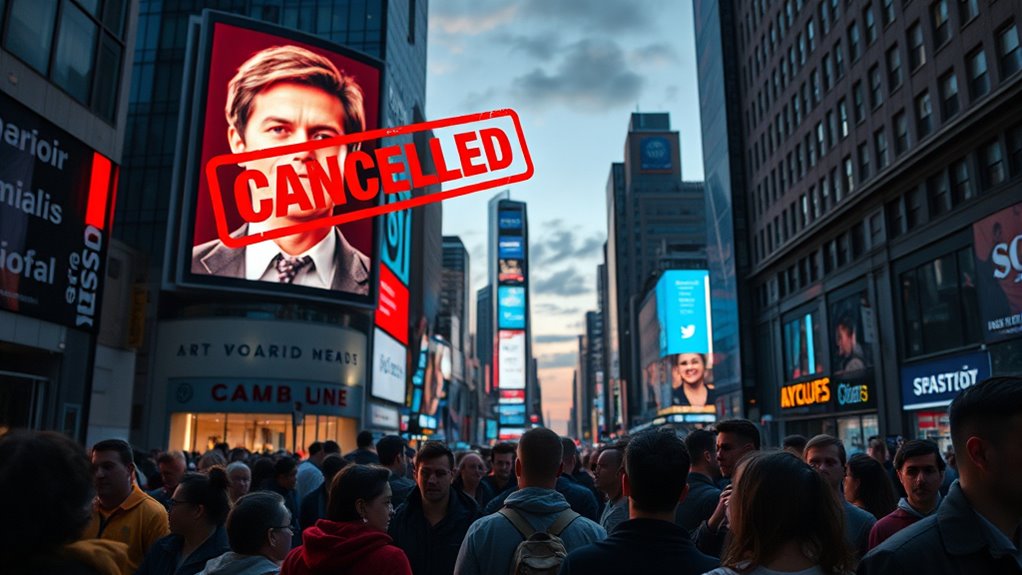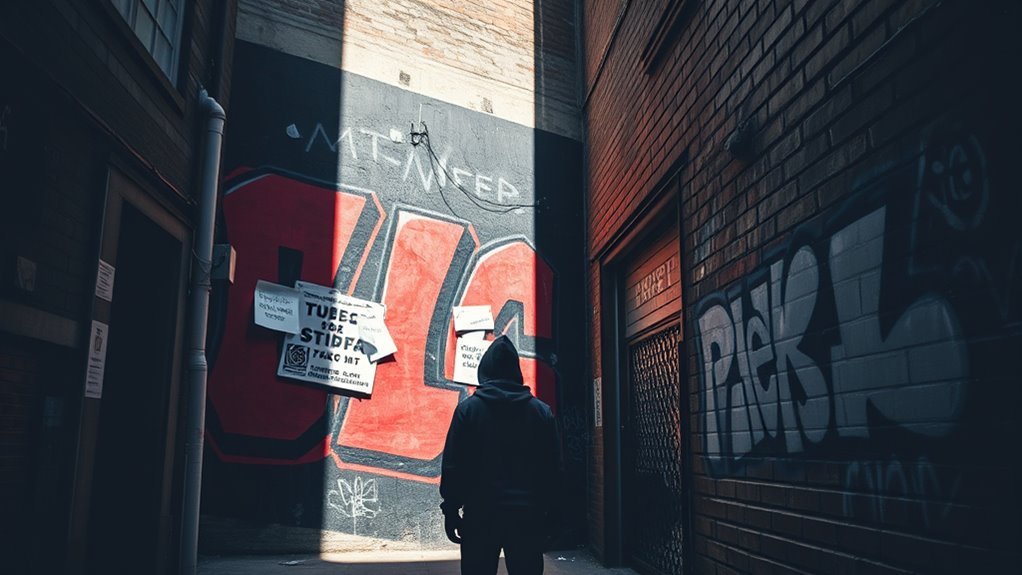Cancel culture can seriously harm both communities and individuals. When outrage spreads quickly online, reputation damage can happen in moments, leading to social exile, lost jobs, and shattered relationships. It creates a climate of fear that stifles open dialogue and deepens divisions, making it hard for people to forgive or understand each other. Staying informed can help you see how this phenomenon shapes social dynamics and community cohesion. Continue if you want to understand its full impact.
Key Takeaways
- Public shaming can destroy individuals’ reputations overnight, causing lasting personal and professional damage.
- Communities may become polarized and divided, discouraging open dialogue and fostering fear of speaking out.
- Social backlash often leads to collective boycotts, dismissals, and social exile, impacting community cohesion.
- The fear of public shaming suppresses free expression and honest debate within communities.
- Broader social tension increases, deepening societal divides and hindering reconciliation efforts.

Have you ever wondered how quickly someone can go from celebrated to canceled? It’s a sudden shift that often happens within moments, driven by public shaming and swift social repercussions. One day, you’re admired, your accomplishments praised, and the next, a misstep or controversial comment sparks a wave of outrage online. Public shaming acts as a catalyst, exposing private mistakes to a massive audience excited to judge and condemn. This digital mob mentality amplifies the consequences far beyond what most people anticipate, turning a single mistake into a full-blown social spectacle.
A single mistake can instantly turn admiration into outrage, fueling a social spectacle online.
When you’re caught in the grip of cancel culture, the social repercussions can be immediate and severe. Your reputation, built over years, can be dismantled overnight, as social media users call for boycotts, dismissals, or social exile. Employers, colleagues, and friends may distance themselves, fearing association with someone who’s been labeled problematic. The ripple effect can extend into personal relationships, causing shame and isolation. The pressure to apologize or distance yourself can feel overwhelming, often leading to public apologies that may or may not satisfy the critics. Sometimes, this results in a cycle where individuals are forced to publicly atone for their mistakes, regardless of whether they genuinely regret their actions.
What makes public shaming so impactful is its ability to distort perceptions of a person’s character based on a single incident. It reduces complex individuals to a single, often misinterpreted, moment. This process can permanently damage careers and personal lives, even if the person has learned or apologized. The social repercussions aren’t just temporary—they can follow someone for years, affecting future opportunities and relationships. The speed at which online outrage spreads means that you might wake up to a controversy that has already spiraled out of control, leaving you scrambling to manage the fallout. Additionally, the influence of online reputation management tools can sometimes mitigate or worsen these effects depending on how they are used.
Cancel culture’s influence stretches beyond the individual to entire communities. It can foster an environment of fear, where people hesitate to speak freely or express unpopular opinions, worried about becoming next in line for public shaming. This climate stifles dialogue and can polarize communities, creating divisions that are difficult to bridge. Even those who want to forgive or understand may find themselves caught between opposing sides, unsure whether to stand by someone or disassociate for the sake of social harmony. In this way, public shaming and the social repercussions of cancel culture shape not just individual lives but the broader social fabric, often leaving lasting scars and deepening divides.
Frequently Asked Questions
How Does Cancel Culture Influence Mental Health?
Cancel culture can profoundly impact your mental health by exposing you to public shaming and intense social repercussions. When you’re targeted, you might experience anxiety, depression, or feelings of isolation as others criticize or ostracize you. The constant online scrutiny can be overwhelming, making it hard to recover emotionally. Recognizing these effects helps you understand how social repercussions from cancel culture can threaten your well-being, emphasizing the importance of supportive communities.
Can Cancel Culture Lead to False Accusations?
Yes, cancel culture can lead to false accusations. When social justice movements drive public backlash, people may rush to judge without full facts, resulting in wrongful claims. This swift condemnation can ruin reputations unfairly, making it hard for the accused to defend themselves. You should remember that emotional reactions often overshadow due process, increasing the risk of false accusations and unjust consequences in the pursuit of justice.
What Are Legal Implications of Cancel Culture?
You could face legal liabilities like defamation lawsuits if cancel culture spreads false information that harms someone’s reputation. When you publicly accuse or criticize someone without proof, you risk legal action for defamation. It is crucial to be cautious with your words online, as spreading false claims can lead to serious legal consequences, including damages and legal costs. Always verify facts before participating in cancel culture discussions to avoid legal trouble.
How Does Cancel Culture Differ Globally?
You’ll notice that cancel culture varies globally due to different social norms and cultural differences. In some countries, public shaming online is more accepted, while others prioritize privacy and forgiveness. You might see communities embracing accountability or condemning it, depending on local values. These cultural differences shape how cancel culture manifests, influencing whether it promotes change or fuels division. Understanding these nuances helps you grasp its global variations better.
Can Cancel Culture Promote Positive Social Change?
Sure, cancel culture can promote positive social change, ironically through public accountability. By holding individuals accountable for harmful actions, it sparks social activism and encourages better behavior. While it often feels harsh, this backlash can motivate genuine reflection and reform. So, in a way, cancel culture acts as a catalyst for progress, pushing society to confront issues and champion values that foster a more just and inclusive community.
Conclusion
Ultimately, cancel culture acts as a mirror, reflecting society’s desire for accountability but also revealing the fragile vessel of forgiveness. Like a fire that can warm or burn, it fuels change but can also destroy relationships and trust. Remember, every ember left behind can either ignite understanding or ignite division. Choose your sparks wisely, for in this delicate dance, you hold the power to build bridges or burn them down.










